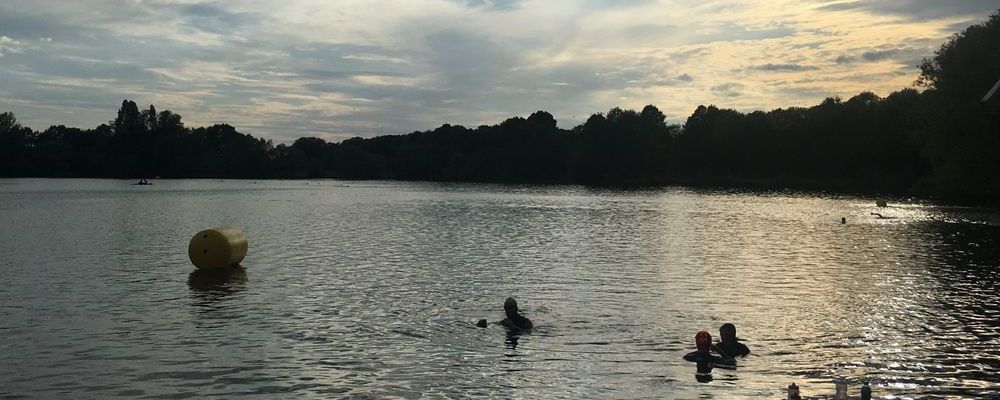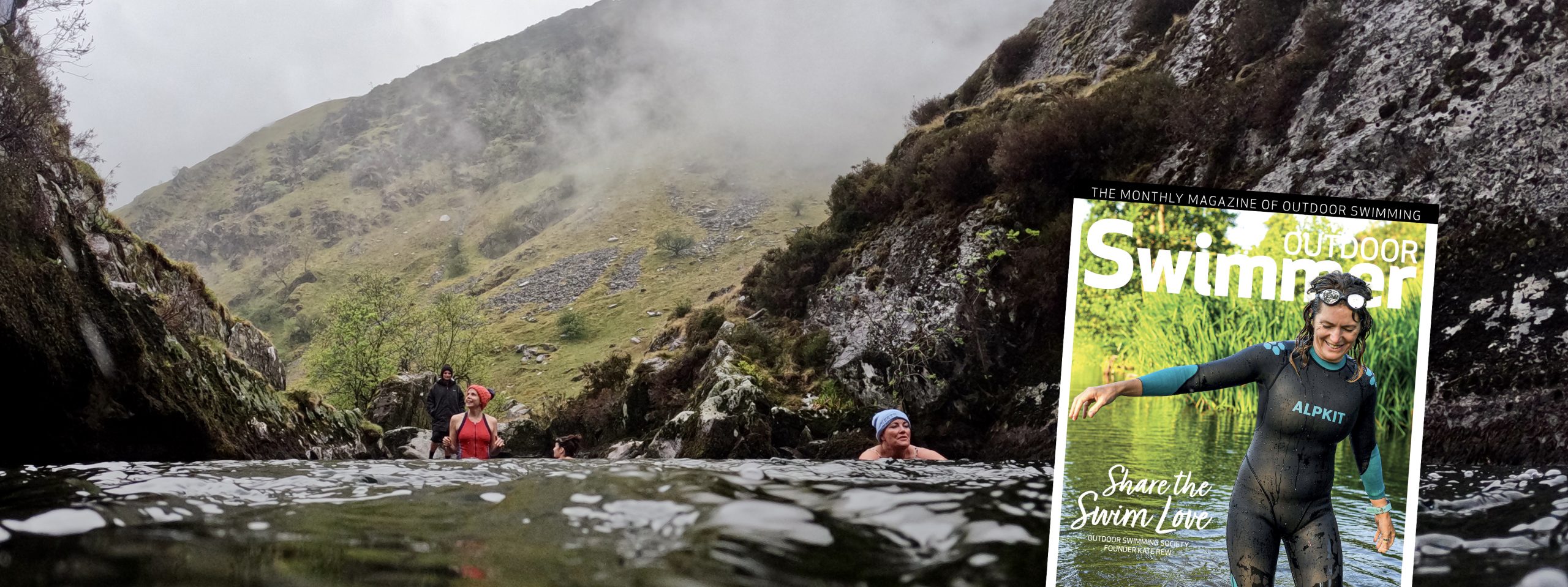What can wild swimming teach us about qualitative research? Traps for the unwary and moments of magic.
Open Water Swimming can be scary, uncovering all sorts of emotions, exposing you to a totally different view of the world, and making you conscious of yourself and the 'self' in context. Can qualitative researchers learn anything from it?

Lockdown has led many of us to look for new ways to get exercise, relieve stress or engage with our natural environment. Open Water Swimming seems to be the new 'thing'; everybody's doing it, including me! Admittedly I've been doing it a few years, so it was no surprise when Daniel asked me if qualitative research and open water swimming have anything in common, or if qualitative researchers could learn anything from it?
Certainly pure 'wild swimming' is just that; 'wild' and limited by only the boundaries of the water and our own capabilities. It's also free, no ticket required, and you don't need any equipment, not even a 'cossie'*! It is entirely natural. It can also be scary, uncovering all sorts of emotions, exposing you to a totally different view of the world, and making you conscious of yourself and the 'self' in context. It creates meaning.
Traps for the unwary and moments of magic
Wild swimming and open water swimming has traps for the unwary. Old shopping trolleys, sudden deep eddies, large waves and rip tides spring to mind. But more likely are simple but real hazards: sharp stones, broken glass, and bits of seaweed making you think you're about to be taken by the Kraken. It can also be colder than you realise, even after you've got out of the water. These kinds of things can give you a fright, make you feel bad or ruin your day, and if mishandled, lead to something worse.
Qualitative research can be like that, and probably has more challenges than swimming, given the infinite contexts in which qualitative research can take place. Simple common-sense precautions can make you aware of hazards and give you some strategies to cope if your fears are realised. In open water, wearing something on your feet is a good idea, and mentally preparing yourself that something brushing your face is probably just a floating leaf so that your body responds accordingly - with a minor 'ooh' and barely a blip in your heart rate. Before going into the research field you will prepare yourself for general hazards: planning your journeys, reading and re-reading about the context so that you can ask suitable questions and avoid causing offense, and practicing with your equipment. But ultimately you're going to have to get in and do it. Like open water swimming, where you might start gently in a small lake or even an open air pool, you could interview a friendly colleague or take a small piece of your data to generate codes from, and ask questions of your data.
Just as doing wild swimming doesn't require me to be able to swim The English Channel or swim in frozen waters, being a qualitative researcher does not require me to expose myself to extreme physical, emotional or psychological dangers. But by taking myself into new waters and testing the boundaries of my comfort and abilities (I taught myself to swim), I have been exposed to intimate moments in nature; the colour of moonlight under the water, the sound of swan's wing brushing over-head, the 'cheep' of a duckling next to my ear, the breath-taking slap of a wave to the face, these moments of (slightly scary) magic have given me insight into my own psyche as well as the natural world, and a perspective on what a well-lived life can be. I feel privileged.
When doing qualitative research I also feel privileged. I'm given access to intimate parts of the human experience, of unique persons' lives. Of course, insight into traumatic or life altering experiences is significant, but the mundane day-to-day life of seemingly 'ordinary' people has much to show us, and just like brushing past a leaf, can be an surprisingly extraordinary experience.
But what's the difference between wild swimming and open water swimming?
This question definitely reminds me of qualitative research. The language and norms of any new discipline can be very confusing, and there are the competing claims of which is right, best, pure or even (ahem) 'true'. Qualitative research has gone through many ideas and claims about what gives us the right kind of access to understanding the human experience; Ethnography, Autoethnography, Phenomenology, Case-study, Biography, Content Framework Analysis, to name a few. As a starting point it's what these approaches have in common that is important, rather than what makes them different. They all have roots in understanding the lived experience of the real world and the story-telling that is unique to human-kind, rather than the measurement of isolated factors out of context.
So, what's the answer to the question? Technically yes, there are differences, and perhaps the closest analogy to general Qualitative Inquiry, is Outdoor Swimming. The last hey-dey of outdoor swimming were the lovely summers of the 1930's, when many of the UK's lidos were built. And yes, cosy and heated and bounded by walls and changing rooms they may be, but there is no roof, so it counts. But it is not wild swimming, nor open water or cold water swimming. However, like qualitative research, there are subtleties and overlaps. You could be an outdoor swimmer in a heated lido with changing rooms and a life-guard, or swim in a lake or bay, perhaps with a pontoon and an entry fee, or a frozen loch half-way up a mountain in winter, or swimming the channel. All of them are outdoors, but only some are wild, and only some are cold, and some are cold and wild. And what about a tidal pool, or an ice-swim in competition? We could argue about the complexities of context and purpose, but they are all outdoors.
Am I doing it right?
I think experienced researchers worry about our claims to knowledge, rather than about doing it 'right'. And for novices it is entirely the wrong question. Like outdoor swimming, there are many, many right ways to do it. To claim to be doing a particular kind of outdoor swimming you need to do your research; read, think, consult, reflect and then actually be doing it. It's same with qualitative research, you might have to start with some general inquiry and think, reflect and adapt before you claim you're a 'wild swimmer'.
Like outdoor swimming, we are not looking for something that is 'right', we are looking for methods that are ethical, safe and fit for the intended purpose of the research. You might decide to swim in a lake as part of a triathlon (a mixed methods approach) or swim daily with group who have decided to collect plastic waste to build a base for a floating community (action research). The point is not what you call it, the point is what you do, and what you claim for your findings.
A certain amount of bravery is required when embarking on a new qualitative project. In our current project Qualitative Researcher Journeys, there is a recurring explicit theme that sometimes you have to 'just do it!' Go, interview those folk, code that data, get in that water, and see what is happening. Teetering and trembling on the edge, creeping in millimetre by millimetre is definitely an option, but often the more painful one. I'm not advocating jumping off a cliff into cold water, anymore than I would advocate going 'into the field' (even if that 'field' is a nice warm office with comfy chairs), without some attention to the challenges that could await you. But 'try it and reflect on what you've learnt' is definitely good advice for the beginner in either field.
So be bold, not foolhardy. Do it, and learn from it.
Cathy is running a 2 day workshop: "Prepare and begin Qualitative Research", read more and register today!
Because we always have your best interests in mind, here's a link to some UK-based safety tips and other advice for outdoor swimming.
https://www.visitcairngorms.com/go-wild-wild-swimming-in-the-cairngorms-with-our-10-top-tips/


*Cossie is a swimming costume.


